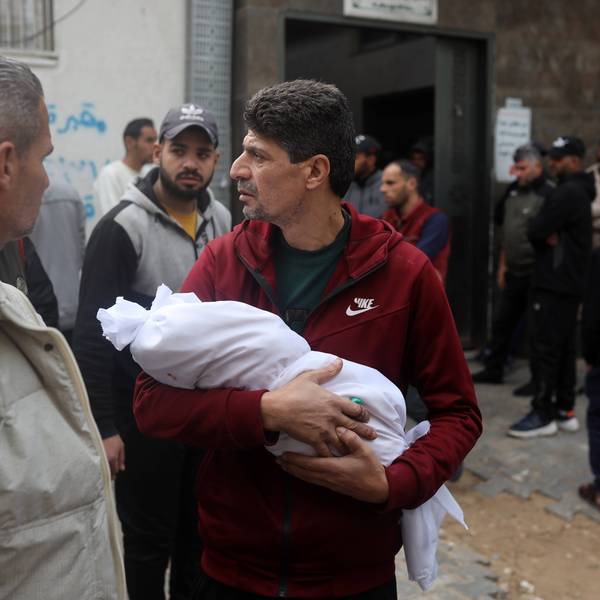Doctors Without Borders on Wednesday evening called out the inadequacy of the United Nations Security Council's newly approved resolution on Gaza, which advocates for "urgent and extended humanitarian pauses and corridors" several weeks into Israel's bombardment and ground operations.
"A population, in its entirety, has been besieged and deprived of the basic means to survive, including access to lifesaving medical care. All while council members deliberated," declared Dr. Christos Christou, international president of the group, also known as Médecins Sans Frontières (MSF).
"The unacceptably jumbled and sluggish process finally led to the adoption of a text that does not come close to reflecting the severity of the humanitarian catastrophe in Gaza," Christou continued. "Today's resolution fails to acknowledge just how necessary a sustained cessation of hostilities is to save lives and to enable humanitarian assistance. Humanitarian pauses, extended though they may be, are not enough."
MSF—which has been working to provide medical care in the besieged enclave—is demanding "the immediate implementation of a sustained cessation of hostilities that ensures the safety and security of civilians, patients, and humanitarian and medical staff across the Gaza Strip."
This is the first Gaza-related resolution to get through the Security Council since a Hamas-led attack on October 7 in which around 1,200 Israelis were killed and another 240 were taken hostage. Since then, Israeli forces have killed over 11,000 Palestinians, wounded thousands more, devastated civilian infrastructure, and displaced about 70% of the strip's 2.3 million population.
The resolution, which also "calls for the immediate and unconditional release of all hostages held by Hamas and other groups, especially children," passed 12-0 with three abstentions—from Russia, the United Kingdom, and the United States.
The Associated Press reported that the U.K. and U.S. abstained because the resolution didn't condemn Hamas' initial attack while Russia did so because of its failure to demand a humanitarian cease-fire. Those three nations, along with China and France, have veto power, which the U.S. used on an earlier resolution calling for "humanitarian pauses."
Israel gets nearly $4 billion in annual military assistance from the United States and U.S. President Joe Biden has requested another $14.3 billion in response to the what critics and experts are describing as Israel's "genocidal" war on Gaza.
Human Rights Watch U.N. director Louis Charbonneau said Wednesday night, "That the U.S. finally stopped paralyzing the Security Council on Israel and Palestine so this resolution on the plight of children in Gaza could move forward should be a wake-up call to Israeli authorities that global concern, even among its allies, is strong."
According to U.N. News, Riyad Mansour, permanent observer for the state of Palestine, told the Security Council that it "should have heeded the call by the U.N. and every humanitarian organization on Earth calling for a humanitarian cease-fire."
Referencing a resolution passed late last month, he added that the council "should have at least echoed the call of the General Assembly for an immediate, durable, and sustained humanitarian truce leading to a cessation of hostilities."
"It is a failure of humanity of terrifying magnitude," Mansour said of current conditions in Gaza. "But for now, the urgency is to save lives. Stop the killing, stop the forced displacement, allow humanitarian aid in and ensure humanitarian access, protect civilians and civilian infrastructure."
"This madness must be brought to an end," he asserted. "It is time for peace."




